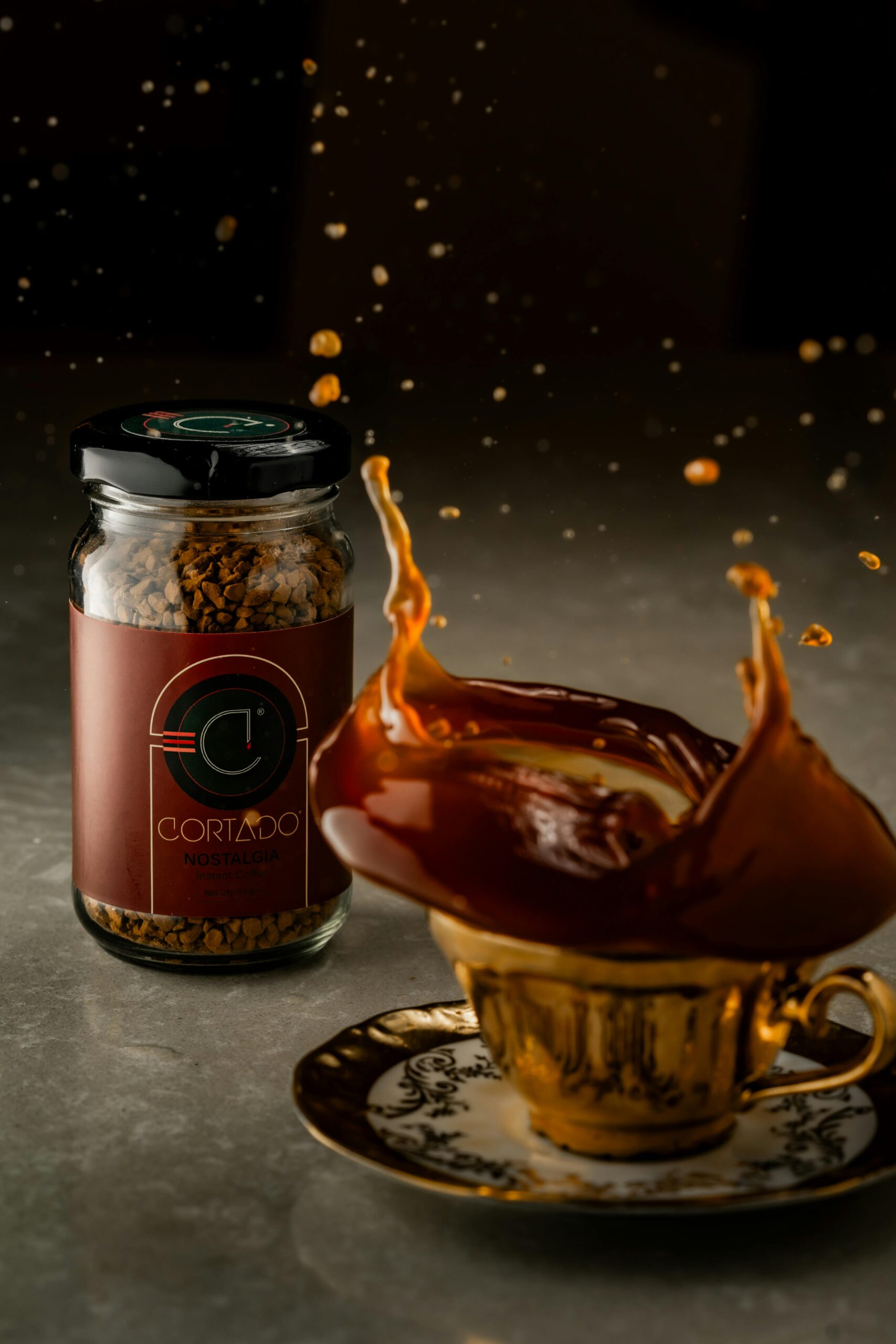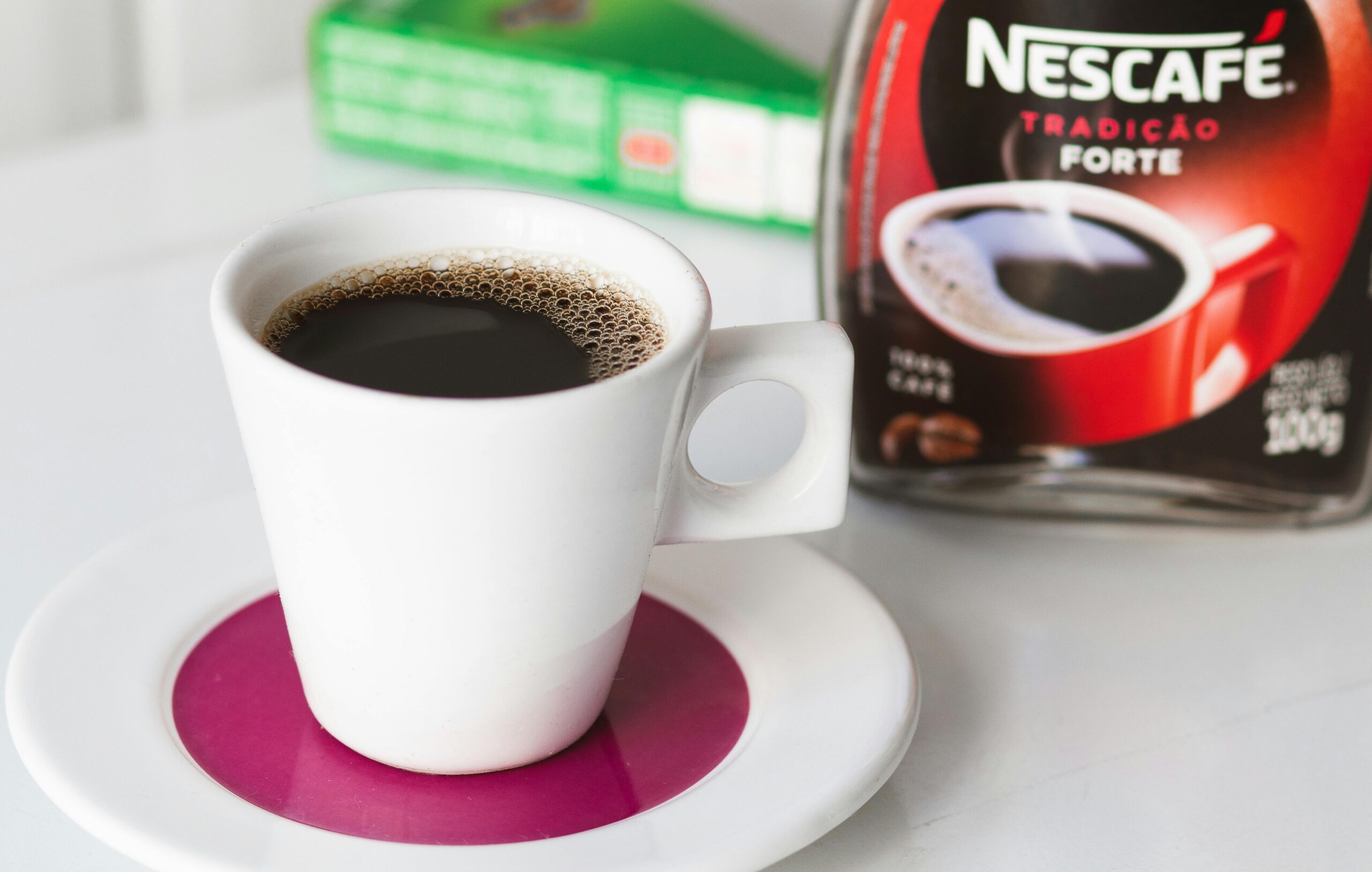
Have you ever wondered if your instant coffee has gone bad? Instant coffee is a convenient and popular choice for many coffee lovers, but like all food products, it does have a shelf life.
Over time, its flavor and aroma can deteriorate, affecting your coffee experience.
Instant coffee generally has a long shelf life, often lasting several years if stored properly, but factors such as exposure to moisture, air, and light can accelerate its decline.
Understanding how to store instant coffee and recognizing signs of spoilage can help you maintain its quality and ensure you enjoy a fresh cup every time.
Does instant coffee go bad?
Yes, instant coffee can go bad over time. It typically has a long shelf life due to its low moisture content, which helps prevent microbial growth.
However, it can lose its flavor and aroma as it ages. Instant coffee should be stored in an airtight container in a cool, dry place to maintain its quality.
While it might not become harmful, old instant coffee can taste stale or bland. Generally, it’s best to use it within the “best by” date on the packaging for optimal flavor.
Here how to make iced coffee with instant coffee.
If you notice any unusual odor, flavor, or appearance, it’s wise to discard it.
Even though it’s unlikely to spoil in a way that could make you sick, quality and taste are definitely affected over time.
What does it mean instant coffee go bad?
When instant coffee “goes bad,” it means that its quality has deteriorated, impacting its flavor, aroma, and overall freshness.
This deterioration is usually due to the breakdown of the coffee’s volatile compounds over time. Instant coffee can become stale, losing its rich, robust flavor and potentially developing an off or flat taste.
Changes in color or the presence of clumps may also signal that the coffee has aged poorly.
Although instant coffee is unlikely to become harmful or unsafe to consume, its sensory qualities—like taste and aroma—can degrade significantly.
Proper storage in an airtight container away from heat, moisture, and light helps extend its shelf life, but even with the best conditions, instant coffee will eventually lose its optimal flavor.
Is it okay to drink expired instant coffee?
Drinking expired instant coffee is generally safe, but it may not be enjoyable. Instant coffee past its expiration date is unlikely to be harmful, as it doesn’t spoil in the same way as perishable foods.
However, its quality can significantly decline. Over time, the flavor and aroma of instant coffee can deteriorate, leading to a stale or bland taste.
If the coffee has been stored properly in an airtight container and shows no signs of mold or unusual odors, it is still safe to consume.
Nonetheless, for the best taste and experience, it’s advisable to use instant coffee before its expiration date. If the coffee seems off or has an unpleasant smell, it’s best to discard it.
Ultimately, expired instant coffee might not be dangerous, but it may not provide the fresh, enjoyable cup you expect.
Here, is instant iced coffee bad for you?
How do you know instant coffee is bad?
To determine if instant coffee is bad, look for several key signs.
First, check the expiration date on the packaging; although instant coffee often remains safe past this date, its quality may decline.
Second, inspect the coffee’s appearance—clumps, discoloration, or visible mold are clear indicators that the coffee has gone bad. Third, smell the coffee; a musty, rancid, or off odor suggests spoilage.
Finally, taste a small amount if the coffee looks and smells okay; if the flavor is flat, stale, or unpleasant, it’s best to discard it.
Proper storage in an airtight container away from moisture, heat, and light can help maintain the coffee’s quality, but even well-stored coffee will eventually lose its freshness over time. Always trust your senses—visual, olfactory, and taste—to judge whether instant coffee is still good to use.
Can you drink coffee 2 years out of date?
Drinking coffee that is 2 years past its expiration date is generally safe, but its quality may be compromised.
Instant coffee, in particular, has a long shelf life due to its low moisture content, which helps prevent microbial growth.

However, after 2 years, the coffee may have lost much of its flavor and aroma, resulting in a stale or bland taste. If the coffee has been stored properly in an airtight container away from moisture, heat, and light, it’s likely safe to consume, but the sensory experience may not be ideal.
Always inspect the coffee for signs of spoilage, such as mold, unusual odors, or clumping, before drinking. If it looks and smells normal, a small taste test can help determine if it’s still palatable.
For the best flavor, it’s advisable to use coffee within its suggested timeframe.
What’s the REAL shelf life of instant coffee?
The real shelf life of instant coffee can vary depending on storage conditions, but generally, it ranges from 2 to 3 years from the date of manufacture.
Instant coffee’s long shelf life is due to its low moisture content, which inhibits microbial growth and spoilage.
Proper storage is crucial for maintaining quality; it should be kept in an airtight container in a cool, dry place, away from heat, moisture, and light.
Even though instant coffee may remain safe to consume beyond this period, its flavor and aroma can degrade over time.
For the best taste, it’s recommended to use instant coffee within 1 to 2 years of purchase. Checking the “best by” date on the packaging can provide a good guideline for optimal freshness.
Always inspect and taste the coffee if it’s past its date to ensure it meets your quality standards.
Does Instant Coffee Expire? Myth Or Misinformation
7 Ways to know if instant coffee go bad
Does instant coffee go bad once opened?
Does instant coffee go bad after expiration date?
Instant coffee can still be safe to consume after its expiration date, but its quality may decline.
The expiration date is a guideline for peak flavor and freshness rather than a strict cutoff.
Over time, the coffee may lose its aroma and taste stale or bland. While it is unlikely to be harmful if stored properly in an airtight container, its sensory attributes might not be ideal.
Always check for signs of spoilage, such as mold, clumping, or off odors, before consuming expired instant coffee to ensure it’s still enjoyable.
Does instant coffee go bad if unopened?
Unopened instant coffee typically has a long shelf life and remains safe to consume for a considerable time, often beyond the printed expiration date.
It can maintain its quality if stored in a cool, dry place away from moisture and light. However, even if unopened, its flavor and aroma may gradually decline over time.
Proper storage in an airtight container helps preserve its freshness. Although the coffee will not become harmful, its taste might not be as robust as when it was fresh.
Always check for any signs of spoilage, such as unusual odors or discoloration, before use.
Does unopened instant coffee go bad?
Unopened instant coffee generally does not go bad quickly but can lose quality over time. Its shelf life is extended if stored properly in a cool, dry place, away from moisture and light.
Although it remains safe to consume past its expiration date, the flavor and aroma may deteriorate, making the coffee taste stale or bland.
An unopened container helps preserve freshness longer, but it’s essential to check for any signs of spoilage, such as off odors or changes in color, before use. Proper storage ensures the best possible taste and quality over time.
Does instant coffee ever go bad?
Instant coffee generally doesn’t go bad in a way that makes it unsafe to consume, but it can lose its quality over time.
It might become stale or bland due to the gradual degradation of its flavor and aroma.
While it can remain safe to drink well past the expiration date if stored properly in a cool, dry place in an airtight container, its taste may not be as fresh.
Signs of spoilage, such as mold, unusual odors, or significant changes in texture or color, indicate that the coffee should be discarded.
Does sealed instant coffee go bad?
Sealed instant coffee has a long shelf life and typically remains safe to consume for an extended period.
However, even when sealed, its quality can diminish over time. Proper storage in a cool, dry place away from moisture and light helps preserve its flavor and aroma.
Although it may not go bad in a harmful way, it can become stale or lose its freshness.
Always check for signs of spoilage, such as off odors or changes in appearance, before using. For optimal taste, it’s best to use sealed instant coffee within its recommended shelf life.
Does instant decaf coffee go bad?
Instant decaf coffee can go bad over time, although it typically remains safe to consume for an extended period.
Like regular instant coffee, its quality may decline, resulting in a stale or bland taste. Proper storage in an airtight container in a cool, dry place helps preserve its freshness.
Even if decaf coffee is past its expiration date, it is generally safe to drink if it shows no signs of spoilage, such as mold, off odors, or significant clumping.
Always inspect and taste the coffee if it’s past its prime to ensure it’s still enjoyable.
Does starbucks instant coffee go bad?
Starbucks instant coffee, like other instant coffee, can go bad over time, though it typically remains safe to consume for an extended period if stored properly. Its quality may decline, leading to a stale or bland taste.
To maintain freshness, store it in an airtight container in a cool, dry place, away from moisture and light. Even if the coffee is past its expiration date, it’s generally safe if it shows no signs of spoilage, such as mold or off odors.
Always check the coffee’s appearance and smell before use to ensure it’s still good.
Does freeze dried instant coffee go bad?
Freeze-dried instant coffee can go bad over time, though it generally remains safe to consume for a long period.
Its quality may deteriorate, affecting flavor and aroma. Proper storage in an airtight container, kept in a cool, dry place away from moisture and light, helps preserve its freshness.
Even if freeze-dried instant coffee is past its expiration date, it’s usually safe if it shows no signs of spoilage, such as mold or off odors.
Check the coffee’s appearance and smell before use to ensure it is still good, and be aware that its taste might be less robust.
Does folgers instant coffee go bad?
Related faq’s
How Long Does Instant Coffee Last Once Opened?
How long does dried or powered instant coffee and tea last? Do they lose their taste over time if left unused?
Dried or powdered instant coffee and tea typically last 1 to 2 years if stored properly in an airtight container, away from moisture, heat, and light.
Over time, they can lose their flavor and aroma, becoming stale or bland, even if they remain safe to consume.
While their shelf life can be extended beyond this period, the sensory quality will degrade.
For optimal taste, it’s best to use them within their recommended shelf life and store them in ideal conditions. Always check for signs of spoilage, such as off odors or clumping, before use.
How long does instant coffee last decent after being opened?
Once opened, instant coffee typically remains decent for about 6 to 12 months.
Proper storage is key to maintaining its quality: keep it in an airtight container in a cool, dry place, away from moisture and light.
While it may still be safe to consume beyond this timeframe, its flavor and aroma can diminish, leading to a stale or bland taste.
To ensure the best taste, use the opened instant coffee within this period and regularly check for signs of spoilage, such as mold or unusual odors. Proper storage helps prolong its freshness and taste.
Is 3-year expired coffee safe to drink?
Coffee that is 3 years past its expiration date is generally safe to drink if it has been stored properly in a cool, dry place in an airtight container.
However, its flavor and aroma are likely to be significantly degraded, resulting in a stale or bland taste.
While the coffee may not be harmful, it’s important to check for any signs of spoilage, such as mold, off odors, or clumping.
If the coffee appears and smells normal, it’s safe to consume, but the taste might not be ideal. For the best experience, consume coffee within its suggested timeframe.
How bad is it to drink 2-year expired Nescafe instant decaf coffee?
Drinking 2-year expired Nescafé instant decaf coffee is generally safe if it has been stored properly in a cool, dry place and shows no signs of spoilage.
However, its flavor and aroma are likely to be diminished, making it taste stale or bland.
While the coffee won’t be harmful, the sensory experience may not be enjoyable. Always inspect the coffee for any signs of mold, unusual odors, or clumping before consuming.
If it looks and smells normal, it’s safe to drink, but for the best taste, it’s advisable to use coffee within its suggested shelf life.
What is the shelf life of an opened package of instant coffee?
An opened package of instant coffee typically has a shelf life of about 6 to 12 months if stored properly.
To maintain its quality, keep it in an airtight container in a cool, dry place, away from moisture and light.
Although the coffee may remain safe to consume beyond this timeframe, its flavor and aroma can degrade, leading to a stale or bland taste.
For the best taste experience, use the opened instant coffee within this period and regularly check for signs of spoilage, such as mold or unusual odors. Proper storage helps prolong freshness and quality.
Does Brewing Coffee In Water Go Bad After A While
Brewing coffee in water can go bad after a while due to bacterial growth and spoilage.
Once brewed, coffee should not be left at room temperature for more than 1 to 2 hours.
After this period, bacteria can begin to grow, leading to off flavors and potential health risks. If coffee is refrigerated, it can last for up to a week, but its flavor may deteriorate over time.
Always store brewed coffee in a clean, airtight container and refrigerate it to extend its freshness. For the best taste and safety, consume brewed coffee within a few days.
Does instant coffee expire?
Instant coffee does expire, but it generally remains safe to consume past its expiration date.
The expiration date is a guideline for optimal flavor and freshness, not a strict cutoff. Over time, instant coffee can lose its aroma and taste stale or bland due to the degradation of its flavor compounds.
Proper storage in an airtight container, away from moisture, heat, and light, helps maintain its quality for longer.
While expired instant coffee is usually safe if there are no signs of spoilage, such as mold or unusual odors, its sensory qualities may not be as enjoyable.
Sealed Coffee expired in 2015, is it safe to make and drink, or just use as plant food?
Tested some instant coffee that expired in 2012 – Data Point
Testing instant coffee that expired in 2012 reveals that, while it is generally safe to consume, its quality has likely deteriorated significantly.
The coffee may taste stale or bland, and its aroma will likely be less pronounced.
Even though it is unlikely to be harmful if stored properly, the sensory experience may be unpleasant.
If the coffee shows no signs of spoilage, such as mold or off odors, it is still safe to drink, but for better taste, consider using it for composting or as a plant fertilizer.
Conclusion
Instant coffee does go bad over time, though it generally remains safe to consume well past its expiration date if stored properly.
Its quality can deteriorate, leading to a stale or bland taste and reduced aroma.
Proper storage in an airtight container in a cool, dry place helps extend its shelf life. Even if instant coffee doesn’t spoil in a harmful way, its flavor and freshness may not be optimal beyond the suggested timeframe.
For the best taste experience, it’s advisable to use instant coffee within its recommended shelf life and regularly check for signs of spoilage.

